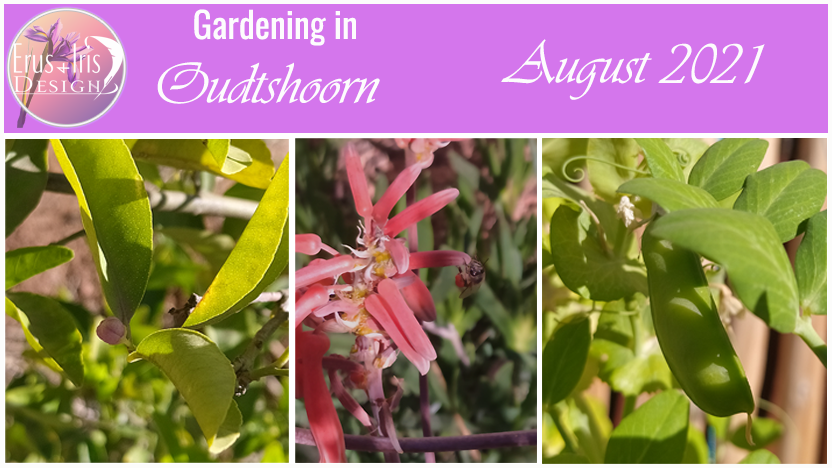
Hello all fellow Hive Gardeners
This post was meant to happen last month, but July was a bit hectic preparing for our in laws visit and our daughter's birthday. I kind of neglected the garden for a while after we had really bad frost here for a solid two weeks mid July.
Massive thank you to @Riverflows for inviting me to take part again, it's motivation on it's own to look at what has happened since the last post.
Our vegetable garden suffered some losses as a result of the cold. I can't really blame them with the amount of snow we had on the mountains. Having moved from a no frost zone to a definite frost zone, I have a lot to learn about planting here and managing to keep things alive.
We were able to keep most of our peas going even through the cold, they seemed to be in a semi sheltered spot. This is probably the most successful crop we've had since moving here. Granted, we wouldn't be able to feed our family off this yield, but my daughter gets to pick two peas each day and eat them right off the plant. This is one of our favourite activities of the day.
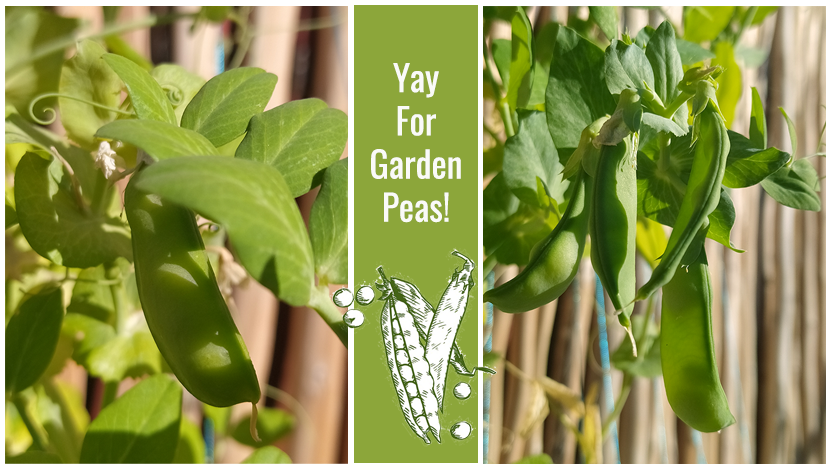
Photos by me, Illustration from Image by Jae Rue from Pixabay
Our vegetable patch which is basically a no dig square has survived our dog and cats and I transplanted our sweetpeas into it, I'm hoping that they will start flowering this month as the weather warms up.
We unfortunately lost all of our beans when the frost hit, but to my delight, the broccolli plants have been quite at home. They aren't yet ready to put out florets, but this is the first time that I have managed to grow brocolli successfully, so I am hopeful.
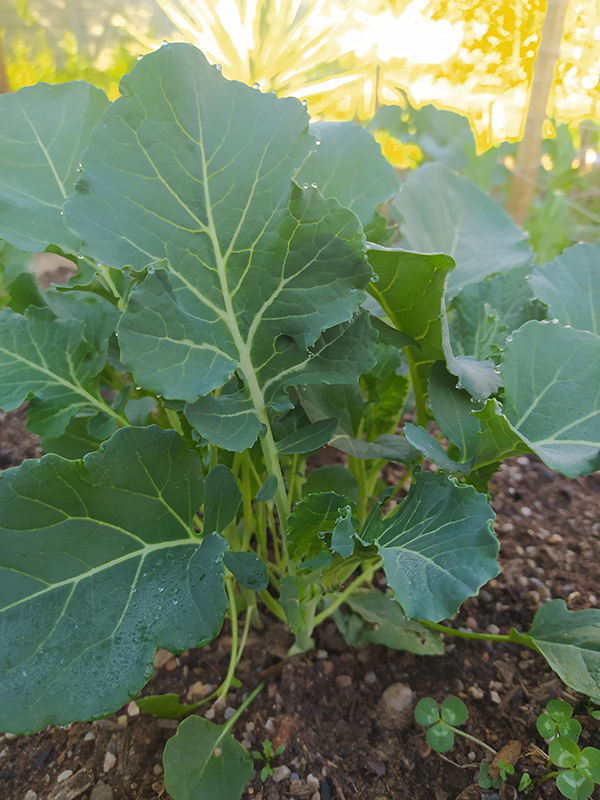
There was a day a few weeks back that I think Lory (our kid) had opened up all the seed containers and used them to try fill the bird feeder...yes, I know, but her heart was in the right place lol. After saving the seeds I could, I decided to sow them instead of returning them to the packaging as some of them had got damp.
To my surprise, the spinach seeds are sprouting up now, so it was a very happy outcome.
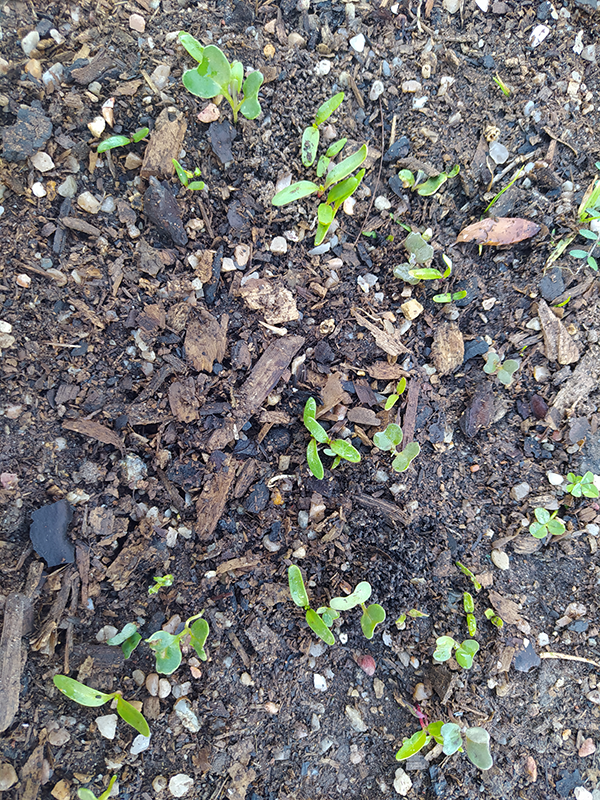
The previous batch I had planted are not doing too badly either. These seeds are actually seeds we bought last year for sprouting, so they seem to be a baby spinach variety.
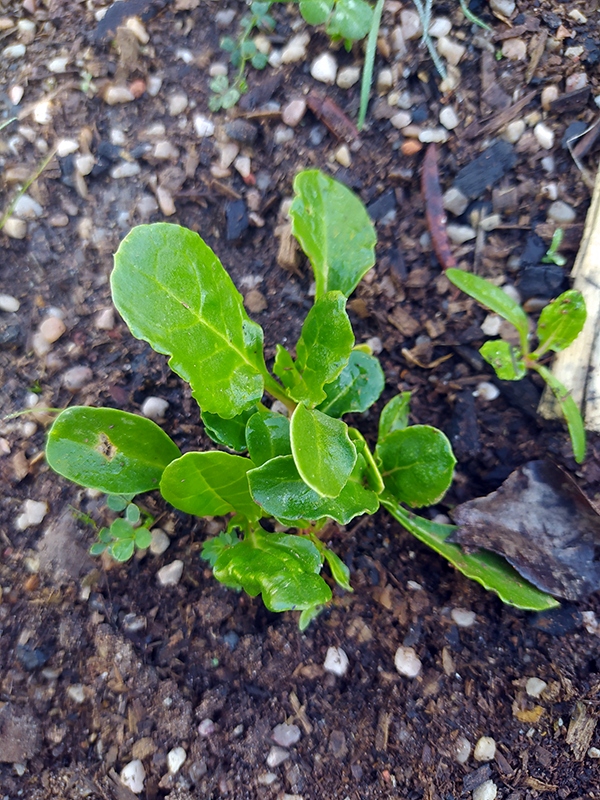
The one massive plus of living here is the almost absolute lack of snails and slugs. I cannot tell you how many crops we lost in Cape Town to what seemed to be a thriving community of Gastropods that we found had made a home under our one planter box. I have never seen such big slugs in my life! Anyway, sorry that was totally a side tangent.
I'm really proud of this...this poor lemon tree had been cut down to practically nothing by the previous tenants and the landlady was really upset. When we moved in it was covered in mielie bug which took me a good month and a half to get rid of. You can read up on that here if you like: https://hive.blog/hive-120078/@andrastia/recycling-in-and-of-the-garden
It is doing so much better now and has put out it's first bud. Seems really late in the season, but I still thing it's a win. I apologize for the bad photography on this one, but it was really difficult to photograph this bud, it's only about 4mm wide and I didn't want to risk damaging it to get it in the light.
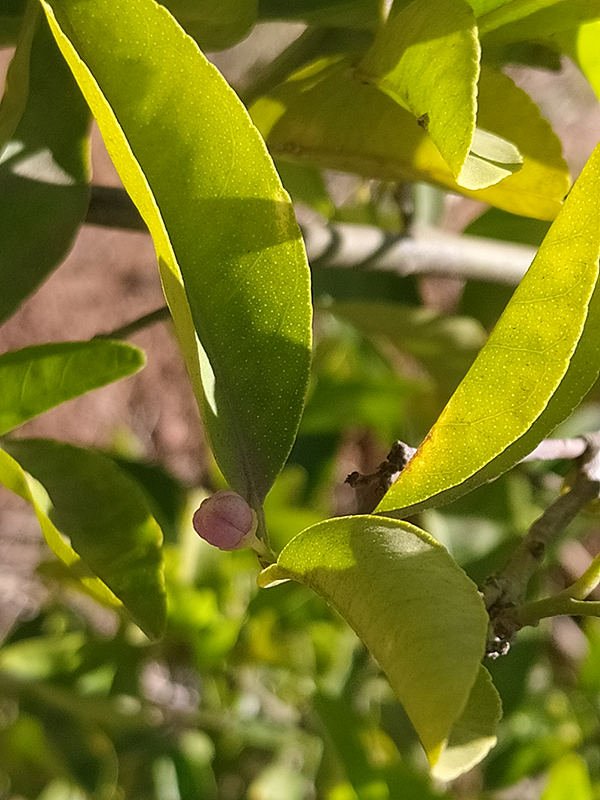
The mulching that we laid around the tree roots has really seemed to help them with the frost and water retention.
We've even had some nice encounters with a Malachite Sunbird visiting the aloes.
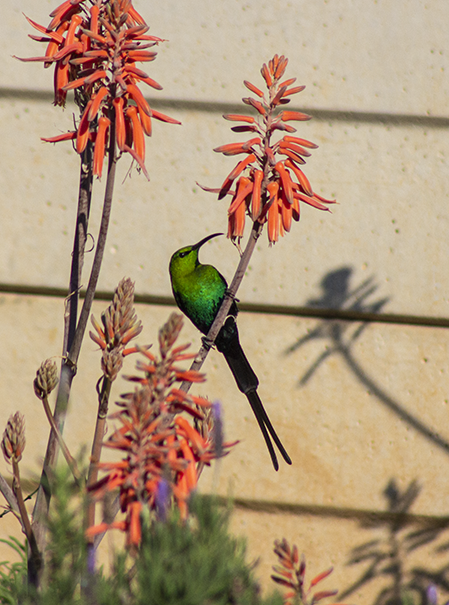
Happy Accidental Plantings
Our compost heap never disappoints when it come to providing accidental plants. 100% of our green kitchen scraps go into the compost bin, so in a strange way it almost guarantees that we will get plants that we do in fact eat. Our latest addition is this accidental potato plant.
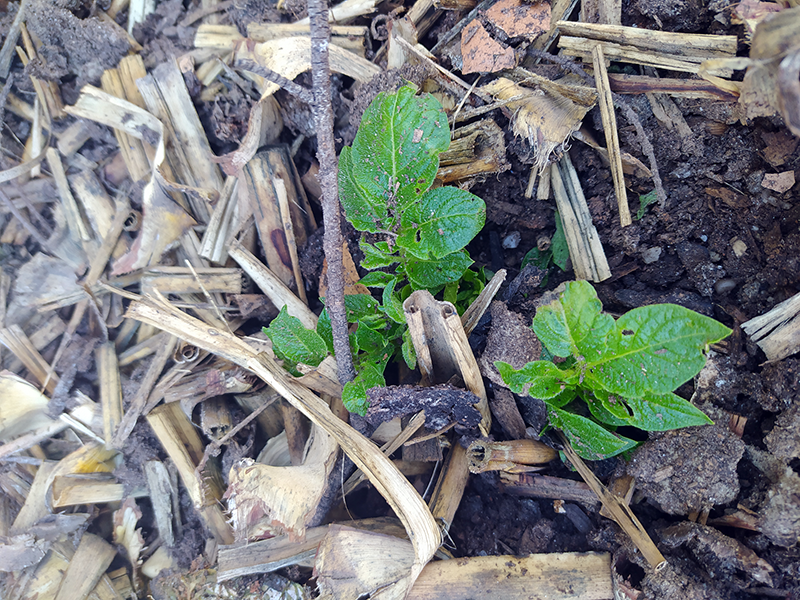
We've also found a few accidental tomatoes from when we gave a compost layer underneath the mulch to our orange tree. I'm not sure if these are going to survive if we get another round of frost. We lost our entire batch of Cherry Tomato seedlings to frost, but I'm hoping the cover of the orange tree might provide some protection to these.
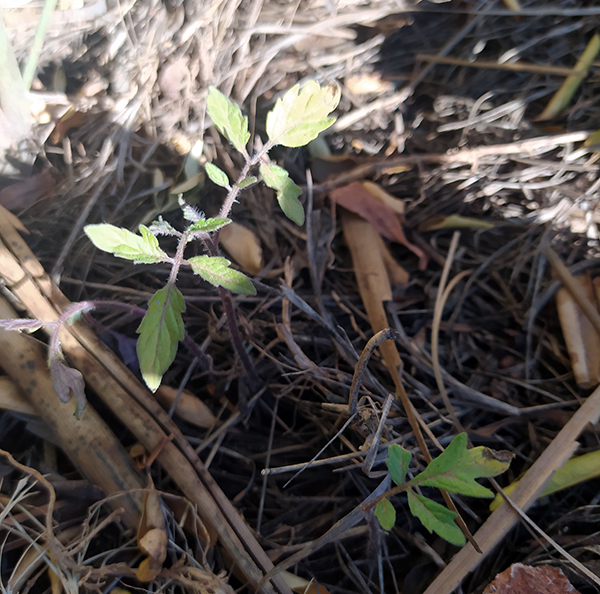
Our compost has now been inhabited by a good bacterium called actinomycetes which is helping to break down the harder stuff. You can also see a pupa of a wasp larvae in here. I don't know why, but wasps seem to love our compost bins. They've taken up residence in every one we've had and last season we had to open it up and let them out (with all the windows closed) so that the newly hatched wasps could emerge and fly off. They weren't small wasps either but they obviously have a need for good soil to reproduce, so we're taking it as a compliment.
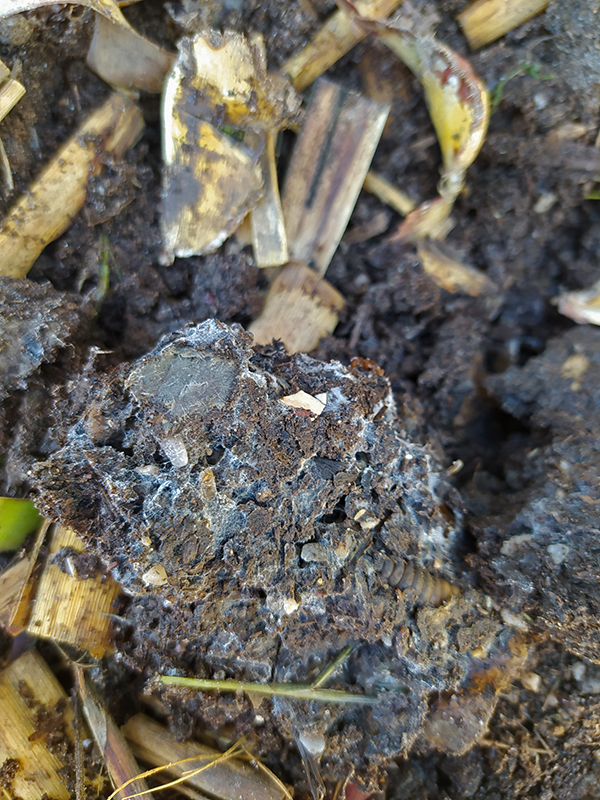
Some other interesting things
I've recently noticed that the bees collecting nectar and pollen from our aloes now have dark pinky orange pollen sacks. I've seen this before where bees collecting from Vicia species have purple pollen sacks. Just an interesting observation, perhaps bee keepers can also use this to work out where their bees are foraging most during certain parts of the year. This apparently also affects the taste of the honey.
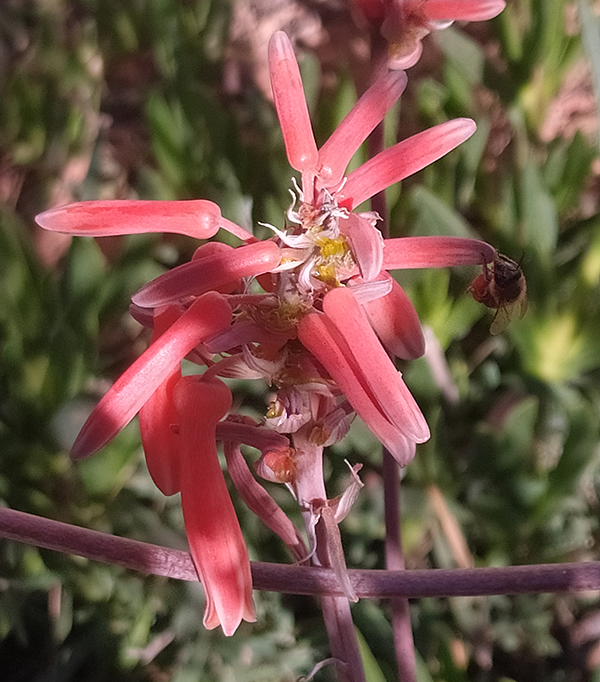
My daughter also found this one brick that has this beautiful mat of moss covering it. It's the only one like this in the garden, so it's considered one of her treasures :) I must admit it does feel really velvety to the touch and she's very tactile, so I get her fascination with it.
Take Away Thoughts
With this climate being quite extreme during summer and winter, I have been researching ways that we can protect our plants for the upcoming really hot months of summer (not looking forward to the 40*C days) and I've got a few ideas.
There is no way that I'm going to fork out R5k on a tunnel system, but seeing as our first veggie patch is square, I'm planning on using our gazebo to shade the plants when it gets really hot. It's sitting in the garage at the moment not being used and won't cost us anything extra to give it a try.
I'm hoping to get another grass cutting when it warms up (even the grass went dormant with the frost) that I can use for mulching around the veggies to keep some of the moisture in. We don't have a water tank but I've been bottling rain water as much as possible for the upcoming dry months and I'm hoping it will at least be enough to keep the veggie patch going. Watering this garden with municipal water is going to be very expensive and I've decided to reserve the laundry grey water for the grass in the front garden because we don't eat that.
Vegetable gardening in Oudtshoorn is quite tricky and I haven't found anyone on YouTube in this region sharing any gardening advice regarding anything edible. I confess that last month I became quite despondent with my vegetable gardening. We seemed to suffer a lot of losses and it was so freezing cold, that it wasn't very pleasant to tend to anything outside. A few days after our daughter's birthday, I found out that my mother had passed away, so I was in a grey area mentally and emotionally and my energy wasn't really right for nurturing plants, so I was doing the bare minimum outside. I've now set aside time each day to tend to them as much a therapeutic session for me as a nourishing session for them.
We'll see how it all goes, one day at a time.
I hope you enjoyed reading this and please feel free to comment and send me suggestions that might occur to you, especially @joanstewart and @goldenoakfarm.
And a Thank You to @riverflows for the invitation, to @shanibeer, @edprivat & @simplymike for supporting the #GARDENJOURNAL challenge.
Have a beautiful day Hivers & Lotusers :)
Beautiful pictures of the bird and bee. So interesting to hear about gardening in other climes. I agree it can be disheartening when your xrop disappears whether through cold or heat or creatures. Sorry to hear about your mother, hope the gardening helps with healing.
Hi Shanibeer
Thanks so much for the lovely message and condolences, it's heartfelt and appreciated.
Even in the most extreme climates nature can surprise us with gifts, so that's what I am trying to hold onto while we wait for spring (in great anticipation).
I'm always encouraged by the other members and by the amazing amount of food resources we can actually produce in small spaces, so I've been very inspired by them.
Have a lovely day.
😍
Congratulations @andrastia! You have completed the following achievement on the Hive blockchain and have been rewarded with new badge(s) :
Your next target is to reach 30 posts.
You can view your badges on your board and compare yourself to others in the Ranking
If you no longer want to receive notifications, reply to this comment with the word
STOPTo support your work, I also upvoted your post!
Check out the last post from @hivebuzz:
I'm sorry to hear about your mom. I'm busy helping someone with succulent cuttings because she wants to make a garden in honour of her mom, it's great therapy.
Winter isn't great for vegetables here in SA, it's too cold for them to really grow much. So-called winter gardening is actually just about getting seedlings in the ground around April so that you can harvest by June, or nursing them through June and July and getting a small harvest by the end of August. Only spinach, the crucifer family and peas are suitable for winter crops, beans don't make it.
For your water needs in summer, mulching will help a lot but also look into drip irrigation which provides targeted water to your plants.
I would buy 40% shade cloth to use with the gazebo, it's not that expensive for a small amount.
Those are not wasps in your compost, they are black soldier flies and they mimic wasps. They are the best compost makers out there Even using plastic cooldrink bottles is an option https://www.growveg.co.za/guides/10-clever-hacks-for-reusing-plastic-bottles-in-the-garden/
Hi Nikv, thanks so much for the message and great info, you are always a wealth of knowledge. Thanks for the tip on the bottles, we've used some inverted bottles in the garden around the fruit trees, but will definitely do more.
The shade cloth will be an absolute must, there is a local supplier here but they seem to only sell 80 and 90%, will look around some more before summer gets here.
Black soldier flies oh wow, that's really interesting. I've read up on them before and they've actually started farming them in parts of SA. I always thought that they were much smaller than these gigantic goggas that like our compost. Good to know and I'm happy to welcome whatever bugs help with the decomposition.
Appreciate your wisdom and help, have a lovely night :)
Hi andrastia,
Visit curiehive.com or join the Curie Discord community to learn more.
Such a lovely post in so many ways. I could really imagine your daughter picking peas and spilling seeds. Future gardeners at work! I'm sorry you felt disheartened with the garden - sounds like you are up against it there. Ten years in here and I have vines and trees that shade the patch more in summer. The gazebo sounds like a great idea. Even tall poles that you can drape shade cloth over in hottest times of year. Sorry to hear about your loss... I'm glad gardening is good therapy for you.
Oh,and the sunbird is incredible!!!
Just wondering what your first and last frost dates are. (And must remember you are south where I am north....)
Hello. Thanks so much for the message, I've looked it up and there's very little, the most conservative first date is 21 May, but ours only started late June, early July. I'll keep it in mind for next season :) You are having much nicer weather now, I saw that some of the farms on the western side are being affected by the smoke from the fires.
I am on the far east side, near-ish Boston, and we are getting the smoke from Canada and the West Coast now....
How beautiful to see children participating in this wonderful work of agriculture. Excellent post.
Thanks so much Chacald. Yes, she absolutely loves it, she's got such green fingers too. Makes me very happy to see her taking gentle care of plants and enjoying the harvests that she grew :)
If you know a frost is coming, maybe using caterpillar tunnels and row cover to try to save the plants. Row cover on first, tunnel over top of all.
If you are going to get those really high temps, planning ahead to find and pile on the mulch may help to some extent. I know my garden did as well as possible in the drought here in Mass this year because I was able to mulch no less than 4" deep everywhere.
I've seen other gardeners here make arches of saplings and string and run the sprawly guys (squash, cukes, etc) up and over them for shade for plantings under the arches.
Be careful using grass clippings that are green. They heat up and can damage plants.